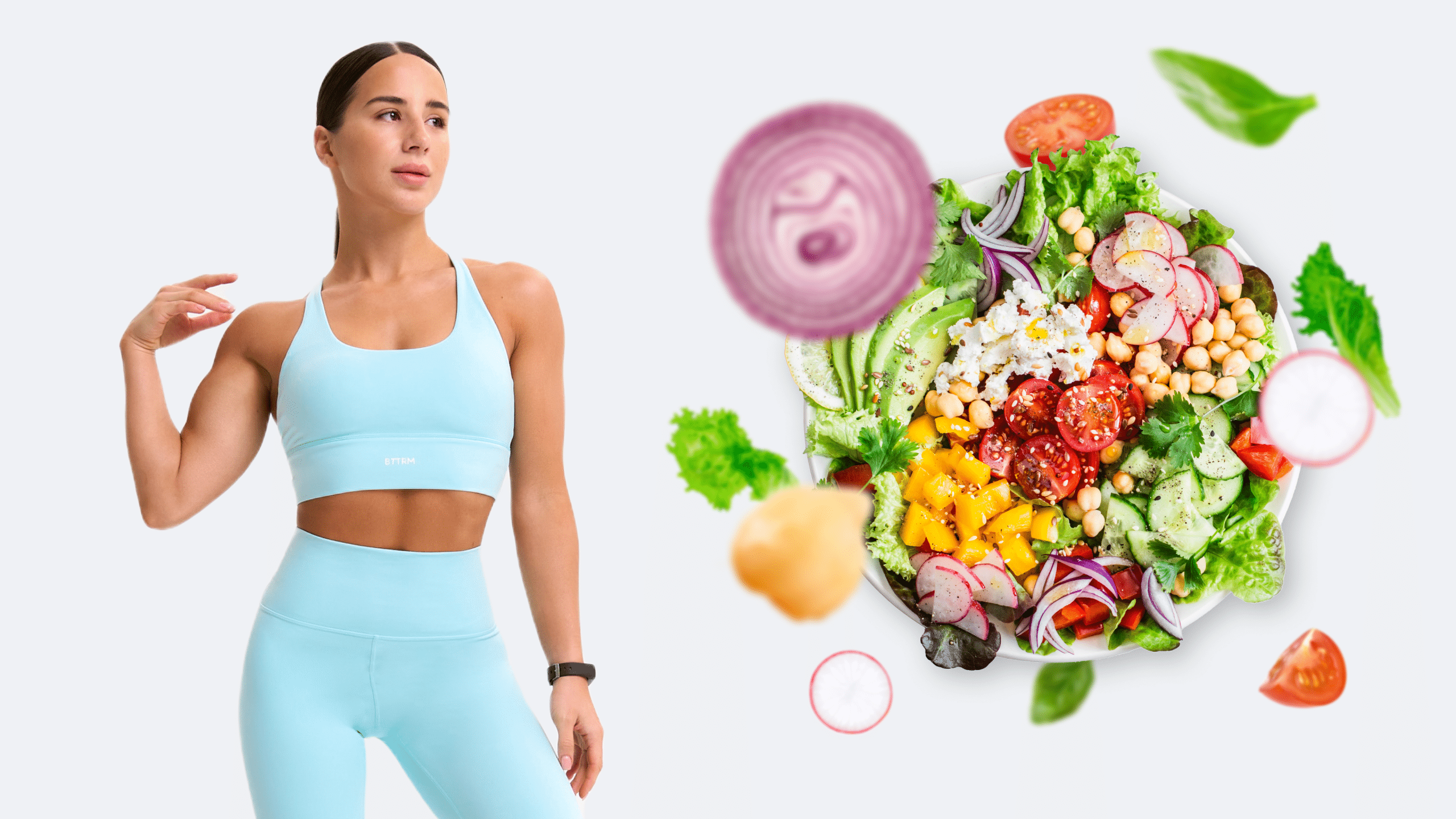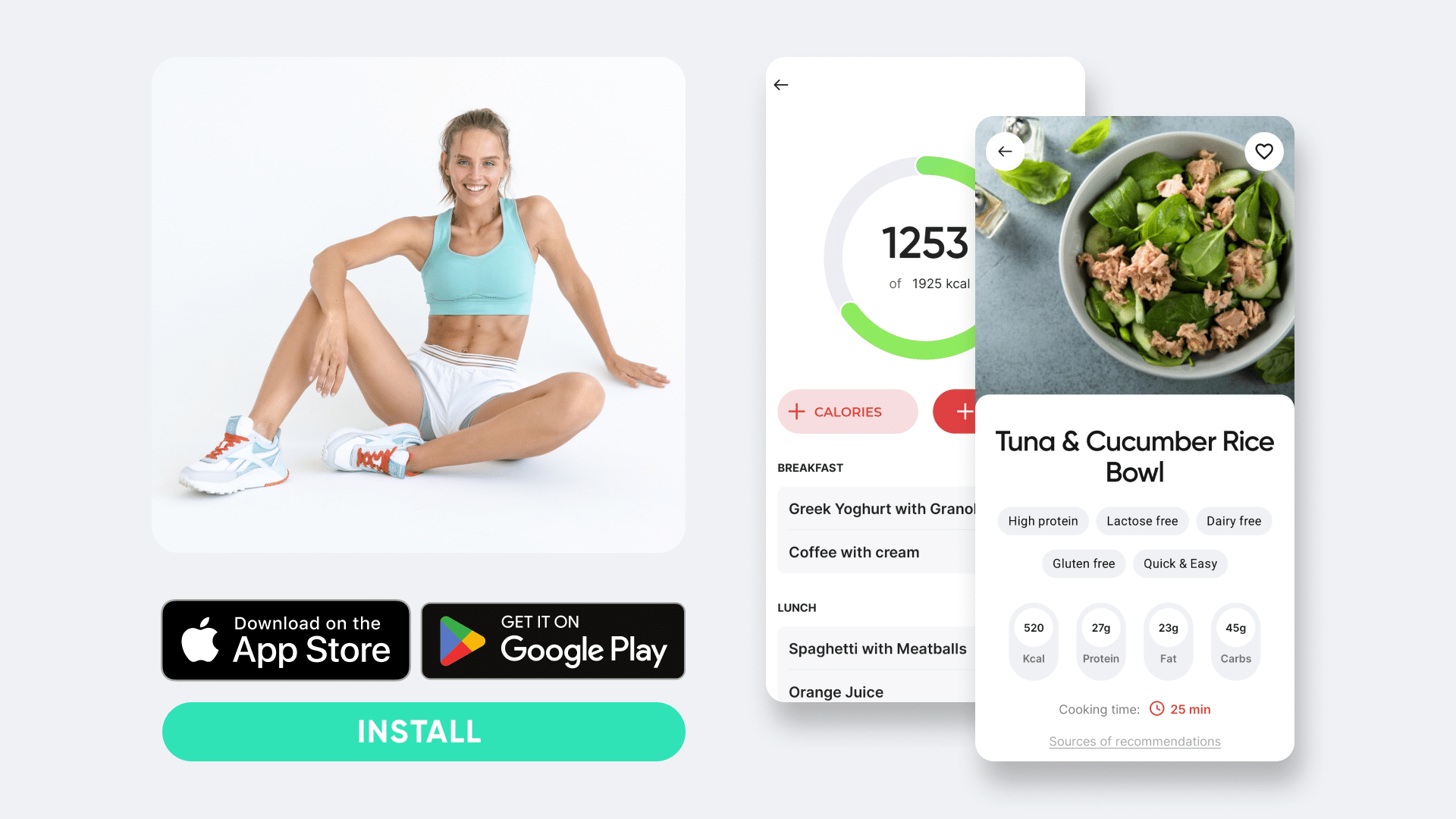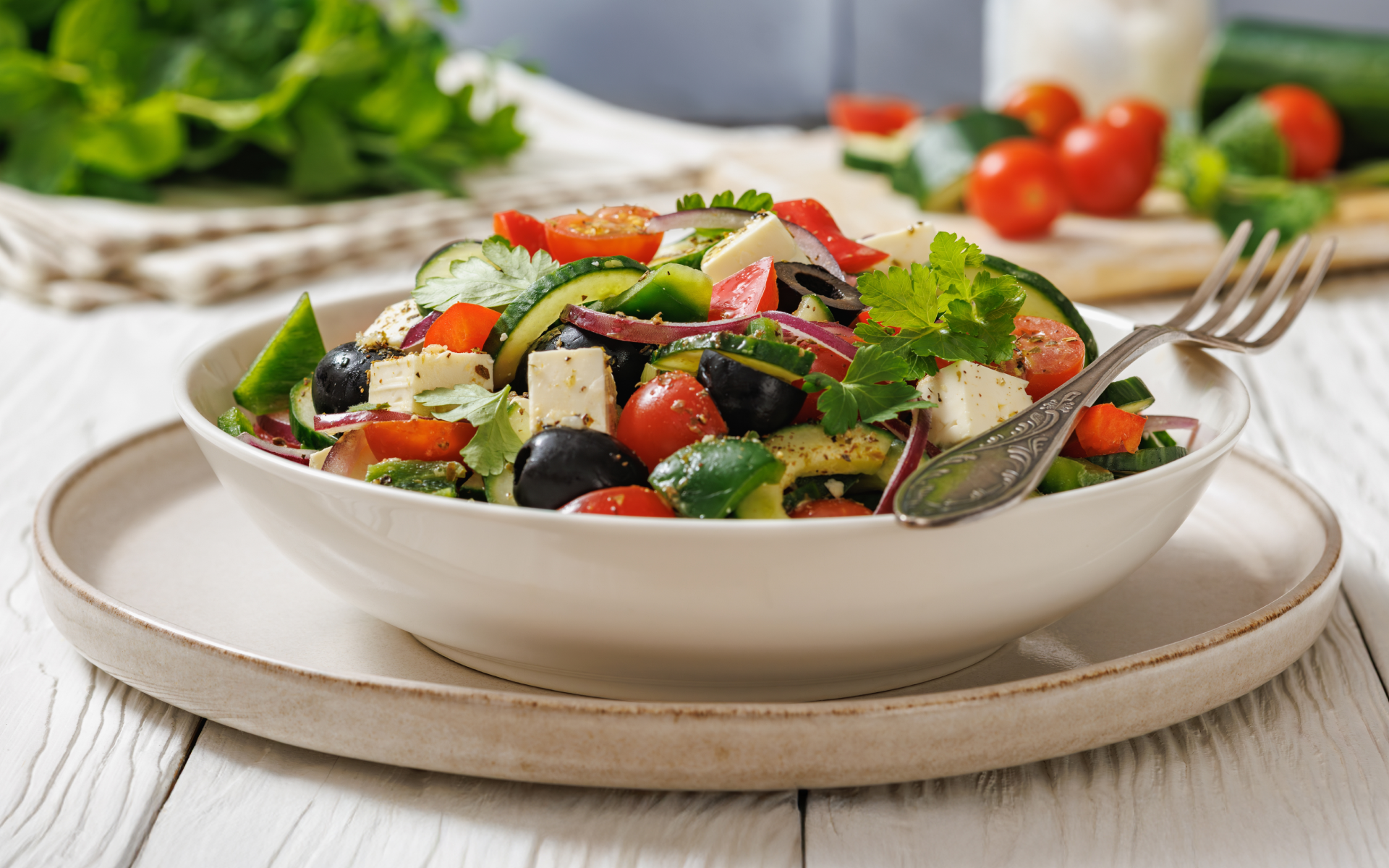Embarking on the path to a healthier lifestyle often leads us to explore different dietary options. Among them, the Mediterranean diet stands strong for its delicious and wholesome approach to eating and is celebrated for its fresh ingredients, earthy flavors, and versatility. Now, imagine blending this timeless diet with vegetarianism for a combination of taste and well-being.
Introduction: The Intersection of Vegetarianism and the Mediterranean Diet
Blending the ethos of vegetarianism with the legacy of a Mediterranean diet offers a unique and delicious pathway to a healthy eating pattern. The Mediterranean diet is revered for its heart-healthy advantages, vibrant flavors, and emphasis on whole foods. By embracing a vegetarian approach, you can reap the benefits while also eating a plant-based diet, which itself has several health benefits, including reduced risks of chronic diseases and a lower carbon footprint.
Defining the Vegetarian Mediterranean Lifestyle
The vegetarian Mediterranean lifestyle is a seamless blend of the traditional Mediterranean approach to eating, which prioritizes fruits, vegetables, whole grains, legumes, nuts, and seeds, and a vegetarian diet that eliminates all meat and seafood (1). This lifestyle emphasizes high-quality plant-based foods, healthy fats, such as olive oil, and modest consumption of dairy and eggs.
Essential Components of a Vegetarian Mediterranean Diet
Starting a vegetarian Mediterranean diet can feel overwhelming initially, particularly if you’re accustomed to a carnivorous diet. However, this plant-based approach is rich in flavors and variety and is also easier to follow. Let’s tell you how.
Following a vegetarian Mediterranean meal plan prioritizes whole, minimally processed foods, ensuring that every plate of food is delicious and nutritious. Our guide will introduce you to the foundational elements of the plant-based Mediterranean diet, offering practical tips and inspiring Mediterranean vegetarian recipes that incorporate wholesome ingredients and heart-happy flavors.
Vegetarian Protein Sources: A Mediterranean Twist
Protein is an essential part of any diet and a vegetarian Mediterranean diet offers a plethora of plant-based protein options for you to try. Whether you’re considering a lifestyle switch or want to explore the vegetarian Mediterranean diet for weight loss first before completely crossing over to the other side, our blueprint provides a step-by-step guide for enhancing your culinary repertoire and maintaining a satisfying, protein-rich diet.
- Legumes: Beans, lentils, chickpeas, and peas are excellent sources of plant-based protein and are prominent in Mediterranean dishes such as hummus, falafel, and lentil soup.
- Nuts and Seeds: Almonds, walnuts, sunflower seeds, and sesame seeds (tahini) are full of protein and healthy fats.
- Dairy and Eggs: For protein lovers, Greek yogurt, feta cheese, and eggs can be phenomenal options, but only if you choose to include them in moderation.
- Whole Grains: Quinoa, farro, bulgur wheat, and others provide protein and fiber, in addition to being full of essential nutrients (2).
- Plant-Based Meat Alternatives: Tofu, tempeh, and seitan are brilliant plant-based meat options that can be creatively used in Mediterranean vegetarian recipes.
The Richness of Mediterranean Vegetables and Fruits
Vegetables and fruits form the foundation of any vegetarian diet and adopting them into your vegetarian Mediterranean diet can help you make the most of their abundance, variety, and seasonal freshness. Key examples are:
- Leafy Greens: Spinach, kale, and arugula can be generously used in salads, stews, curries, snacks, and side dishes. Kale chips are a fabulous snack and are low in calories.
- Vegetables: Edamame, Brussel sprouts, cabbage, cucumbers, onion, artichoke hearts, zucchini, garlic, ginger, carrots, mushrooms, corn, sweet potatoes, and more; fill your plate with a rainbow of colorful vegetables.
- Fresh Herbs: Cilantro, basil, parsley, oregano, chives, and tarragon add a touch of freshness to any meal.
- Spices: Turmeric, cumin, chili powder, allspice, cinnamon, nutmeg, paprika, and more can add a depth of flavor to any simple meal.
- Tomatoes: A staple in Mediterranean cuisine, tomatoes are perfect for sauces, salads, curries, and roasted dishes.
- Peppers: Bell peppers and chili peppers add color and flavor to most meals, which ensures you eat the rainbow.
- Avocados, Olives, and Olive Oil: Integral to the plant-based Mediterranean diet, avocados, olives, and olive oil are beautiful as toppings, in dressings, for cooking, and as a snack to pair with hummus, pita, or bread.
- Berries and Citrus Fruits: Strawberries, blueberries, cranberries, oranges, tangerines, and lemons add a tart sweetness to any dish or a satiating snack. They’re also full of essential vitamins.
Lean and toned up body isn’t just a far-fetched fantasy. Check out the BetterMe app and watch it propel your weight loss journey into high gear!
Planning Your Vegetarian Mediterranean Diet
For those who have followed a carnivorous diet in the past, transitioning to a plant-based Mediterranean diet may feel challenging. However, with mindful planning and an open mind, you’ll find this diet is both achievable and immensely rewarding.
By prioritizing a diverse range of fruits, vegetables, whole grains, legumes, nuts, and seeds, you can create fulfilling and mouth-watering meals. We’ve put together a Mediterranean diet vegetarian meal plan to inspire you to integrate these principles into your lifestyle, paving the way for a healthier and more mindful way of eating.
Building a Balanced Meal Plan
A balanced vegetarian Mediterranean meal plan consists of a variety of food groups to ensure satiety and nutrition adequacy. This dietary approach emphasizes a plethora of different foods, each of which provides unique health advantages and builds overall well-being. Create your Mediterranean diet meal plan vegetarian with the following tips in mind:
- Breakfast: Break your fast in the mornings with a nourishing plate of food for sustained energy and full of essential nutrients. Choose options such as Greek yogurt parfaits topped with fresh fruits and nuts, or avocado toast on whole-grain bread layered with nut butter and seeds. These meals are full of protein, healthy fats, and fiber, and set a wonderful tone for the day.
- Lunch: For lunch, you can opt for hearty salads or grain bowls that are both delicious and nutrient-rich. Mix your choice of greens, chickpeas, cherry tomatoes, cucumbers, olives, and feta cheese, dressed in a mixture of olive oil and lemon juice. This will ensure you eat fiber, vitamins, and minerals, all in one bowl.
- Dinner: Dinner is the perfect chance for you to add an abundance of vegetables, whole grains, and plant-based proteins. The last meal of your day can be light on the tummy and filling if you opt for vegetable and quinoa stuffed bell peppers or a lentil and vegetable stew served with a side of seasoned whole-grain bread. This is perfect to support your overall health and wellness.
- Snacks: With a wide range of vegetarian foods to choose from, snacks can be simple and nutritious, without needing much planning. Fresh fruits, nuts, or sliced vegetables with garlic hummus or peanut butter will provide a quick energy boost during that midday slump.
By following these simple tips, you can build a vegetarian Mediterranean meal plan that’s satisfying, well-balanced, and supports all of your weight management and lifestyle goals.
Sample Meals and Recipes
Now that you’re more familiar with the vegetarian Mediterranean diet, let’s explore a few recipes that are full of simplicity and satisfying flavors. We’ve put together some sample Mediterranean vegetarian recipes that are designed to inspire and guide you.
Mediterranean Chickpea Salad
Ingredients:
- 1 can of chickpeas, drained and rinsed
- 1 cucumber, diced
- 1 red bell pepper, diced
- ¼ red onion, thinly sliced
- ¼ cup kalamata olives, pitted and halved
- ¼ cup feta cheese, crumbled
- 2 tbsp olive oil
- 1 tbsp lemon juice
- Salt and pepper, according to preference
- Fresh parsley
Method:
- Mix the chickpeas in a large bowl with the cucumber, bell pepper, red onion, olives, and crumbled feta.
- Drizzle olive oil and lemon juice on top generously.
- Season with salt and pepper and mix thoroughly.
- Garnish with fresh parsley, according to your preference, and enjoy.
Mediterranean Spelt-Stuffed Peppers (3)
Ingredients:
- 4 large red bell peppers, halved and deseeded with the stems on
- 100 g fresh sundried tomatoes, diced plus 2 tbsp tomato oil
- 1 large red onion, spiralized
- 1 large courgette, spiralized into noodles
- 250 g cooked spelt
- 100 g mixed olives, deseeded and chopped
- Shredded basil to taste
- Green salad, a mix of veggies of your choice
Method
- Heat the oven to 200℃.
- Place the peppers cut-side up on a roasting tray and drizzle 1 tbsp sundried tomato oil over them. Season with salt and black pepper and then roast for 20-25 minutes until the peppers turn tender.
- Separately, heat the remaining sundried tomato oil in a frying pan on medium flame. Toss the red onion and cook for 2-3 minutes until soft, then remove.
- Add the rest of the ingredients and top with seasonings. Once the peppers are done, fill them with the spelt mix and return to the oven for 5 minutes for it all to come together.
- Serve with a green salad on the side and enjoy.
Read more: The Pesco Mediterranean Diet Explained
One-Pot Lentils and Rice with Spinach (4)
Ingredients:
- 3 tbsp extra-virgin olive oil
- 1 large onion, chopped
- 4 large garlic cloves, minced
- 1 tbsp cumin powder
- 1 tsp salt, or to taste
- 2 bay leaves
- ¼ tsp pepper powder
- ¼ tsp red pepper powder
- ¾ cup long-grain brown rice, or rice of choice
- 3 ¾ cups of water
- ¾ cup brown or green lentils
- 10 ounces of chopped spinach
- 1 tbsp sherry vinegar
- Scallions, sliced
- Cilantro or parsley, chopped
Method:
- Heat oil in a saucepan on medium heat.
- Add the onion and cook for 3-4 minutes until translucent.
- Add the garlic, cumin, salt, bay leaves, pepper, and red pepper, stirring for approximately a minute.
- Add rice and evenly spread across the pan.
- Add the water and bring the dish to a boil.
- Reduce heat, cover, and allow to simmer for another 15 minutes.
- Next, add the lentils and cook until tender. The water should be absorbed for another 15-20 minutes.
- Switch off the heat and stir in the spinach.
- Replace the lid by covering the saucepan with a clean dish towel. The towel will absorb all the steam. Allow to sit for approximately 10 minutes.
- Stir in the vinegar and get the bay leaves out.
- Garnish with scallions and cilantro and enjoy.
Looking for a way to break the vicious cycle of weight loss and tone up all the jiggly parts? Watch the extra pounds fly off and your muscles firm up with the BetterMe app!
Living the Diet: Practical Tips and Inspiration
Armed with the knowledge from this guide, you’ll be able to transition into the vegetarian Mediterranean diet with flying colors. This culinary adventure that’s full of vibrant fruits, crisp vegetables, hearty grains, and flavorful legumes will inspire you to make the most of seasonal produce, create balanced meal plans, and ensure every plate of food is delicious and healthy. Our practical tips will help you integrate the vegetarian Mediterranean diet into your life, ensuring you follow through and thrive on its delightful richness.
Shopping and Seasonal Eating
We’ve put together a few practical tips to help you maximize the nutritional benefits and abundant flavors of the vegetarian Mediterranean diet. Follow them to make the most of it.
- Seasonal Produce: Opt for seasonal fruits and vegetables for peak freshness and flavor. As a bonus, they also tend to be more affordable.
- Local Markets: Shop at local farmers’ markets or neighborhood produce stands to support local farmers and agriculture. This will ensure you have access to fresh, high-quality ingredients.
- Pantry Staples: Keep your pantry stocked with all the fundamental essentials such as olive oil or grapeseed oil, canned beans or chickpeas, whole grains, nuts, and dried herbs.
Sustaining the Diet in the Long Term
Staying onboard a vegetarian Mediterranean diet should be both satisfying and sustainable and you can ensure it remains so by using the following strategies:
- Variety: Don’t shy away from experimenting with various Mediterranean vegetarian recipes and ingredients. This will keep your meals interesting, flavorsome, and nutritionally diverse.
- Meal Prep: Take a day out of the week to prepare your meals in advance. This will save time and ensure you have healthy options available throughout the week.
- Social Support: Get together with your family and friends to enjoy meals. This will keep you motivated to stay on board the diet train while bringing you the joy of eating meals together.
Read more: Healthy Mediterranean Eggplant Salad Recipe
FAQs
Can I get enough protein from a vegetarian Mediterranean diet?
Of course you can. You should incorporate a variety of plant-based proteins such as tofu and other soy products, beans and legumes, nuts, seeds, whole grains, and optional dairy and eggs to meet your daily intake of protein.
How can I replace the seafood that is typically included in a Mediterranean diet?
You can easily find plant-based protein alternatives to seafood in tofu, tempeh, and legumes. Seaweed and algae-based products also have a similar flavor and a robust nutritional profile.
Are there any Mediterranean foods I should limit on a vegetarian diet?
Ensure you’re not consuming a lot of ultra-processed foods and those that are high in added sugars. In addition, you should eat dairy and eggs in moderation if you choose to include them in your diet.
How can I ensure variety in my vegetarian Mediterranean meals?
When meal prepping for the week, make sure you have a rotation of a variety of fruits, vegetables, grains, and proteins. Discover new recipes and explore new ways of cooking to inspire joy on this Mediterranean diet journey.
What are some key ingredients I should always have in my pantry?
Stock your pantry with everyday essentials such as olive oil, dry and canned beans, lentils, chickpeas, whole grains (quinoa, farro, brown rice), nuts, seeds, dried herbs, and spices for easy-to-make recipes.
Can I follow a vegetarian Mediterranean diet if I’m lactose intolerant?
Absolutely. Opt for lactose-free dairy products or plant-based alternatives such as almond milk, oat milk, coconut yogurt, cashew cheese, and other dairy-free cheeses. Or simply skip dairy altogether.
How does a vegetarian Mediterranean diet support long-term health?
The vegetarian Mediterranean diet is rich in antioxidants, fiber, and healthy fats, which may help reduce inflammation, improve heart health, and support digestive health and overall mental and physical well-being.
The Bottom Line
Embracing a vegetarian Mediterranean diet is a fulfilling way to enhance your lifestyle while also enjoying an abundant palette of delicious food. By focusing on whole, plant-based ingredients, healthy fats, and seasonal produce, you can mindfully create a diet structure that nourishes and satisfies you. So, with this guide, let the flavors of the Mediterranean lifestyle bring joy into your life and reap the long-term health benefits it offers.
DISCLAIMER:
This article is intended for general informational purposes only and does not serve to address individual circumstances. It is not a substitute for professional advice or help and should not be relied on for making any kind of decision-making. Any action taken as a direct or indirect result of the information in this article is entirely at your own risk and is your sole responsibility.
BetterMe, its content staff, and its medical advisors accept no responsibility for inaccuracies, errors, misstatements, inconsistencies, or omissions and specifically disclaim any liability, loss or risk, personal, professional or otherwise, which may be incurred as a consequence, directly or indirectly, of the use and/or application of any content.
You should always seek the advice of your physician or other qualified health provider with any questions you may have regarding a medical condition or your specific situation. Never disregard professional medical advice or delay seeking it because of BetterMe content. If you suspect or think you may have a medical emergency, call your doctor.
SOURCES:
- An Update on the Mediterranean, Vegetarian, and DASH Eating Patterns in People With Type 2 Diabetes (2020, ncbi.nlm.nih.gov)
- Vegan Mediterranean Diet Meal Plan (2024, eatingwell.com)
- Vegetarian Mediterranean recipes (bbcgoodfood.com)
- 23 One-Pot Vegetarian Mediterranean Diet Dinners (2024, eatingwell.com)










